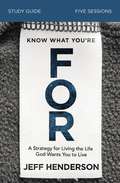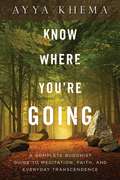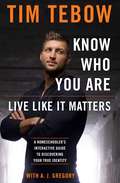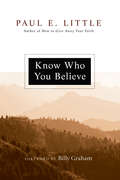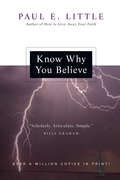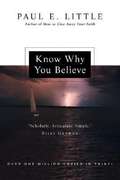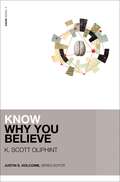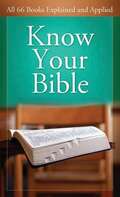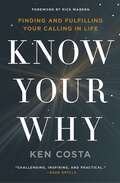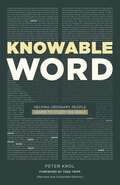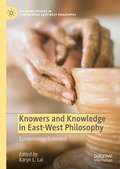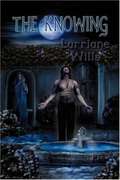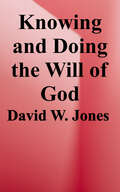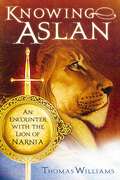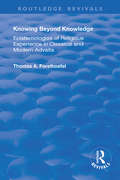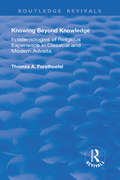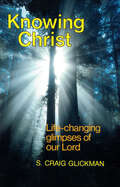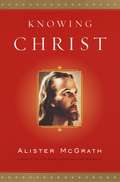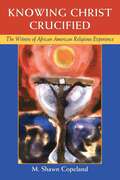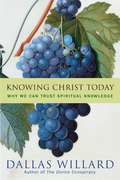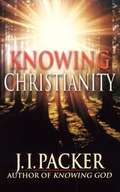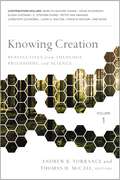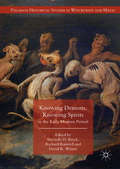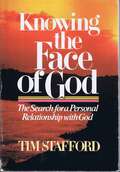- Table View
- List View
Know What You're FOR Study Guide: A Strategy for Living the Life God Wants You to Live
by Jeff HendersonDo the people in your world know you&’re FOR them?In our world today, people are often known more for what they are against than what they are for. Unfortunately, this extends even into the church. We want to reach the lost with the incredible good news of Christ, but often all they ever hear us emphasize are the behaviors and attitudes we are against.In this video Bible study (DVD/digital videos sold separately), pastor Jeff Henderson points out God is FOR the people in our world. He is FOR breaking down unnecessary barriers that keep people away from experiencing his love. And as his followers, he calls us to be spouses, parents, friends, leaders, and employees who do the same.The Know What You&’re FOR Study Guide includes video teaching notes, discussion questions, and weekly personal study and reflection questions.Sessions include:What Are You FOR?FOR Your WorldFOR Your TeamFOR Your CommunityFOR Your LifeDesigned for use with Know What You&’re FOR Video Study (9780310119654); sold separately. Streaming video also available.
Know Where You're Going
by Ayya Ayya KhemaExperience a complete meditation course with one of the West's most renowned Buddhist teachers.Know Where You're Going provides a full course of instruction in Buddhist meditation and reflection, and contains a wealth of exercises and advice to help the reader grow. As we put these teachings into practice over time, we learn to see things as they really are and discover transcendence right here in our everyday lives. Ayya Khema shows us how to live a wholehearted spiritual life, even amid our day to day concerns and responsibilities. Her teachings unfold simply, free of jargon, and are ideal for the contemporary world. Grounding the practice of more advanced meditations in a deeply cultivated sense of mindfulness, love, and altruism, Khema shows us, step by step, how to access to liberation and freedom.
Know Who You Are. Live Like It Matters.: A Homeschooler's Interactive Guide to Discovering Your True Identity
by Tim TebowThe World Does Not Define You!Nobody said your life would be easy. And the older you get, the more difficult it seems to become. Deep down you may know your value as a person isn’t defined by wearing cool name-brand clothes, scoring points for a sports team, or even by having a huge number of social media followers. And you’re right! Your identity resides in something—in fact, Someone—much greater than anything this world can offer: The only identity worth having…is found in Jesus Christ!American sports icon, Tim Tebow knows firsthand what it's like to face pressure head-on. In Know Who You Are. Live Like It Matters, he shares the wisdom he’s learned—not from what the world says, but from what God says in His Word. Tim will guide you through thirty-six weeks of lessons, each based on a key Scripture, to discover who you are—by learning more about whose you are! You will also have the opportunity to write down your thoughts, feelings, and ideas on topics such as:* Building godly character * Maintaining great relationships * Standing out from the crowd * Doing things that matter in the big pictureGet ready to live bigger than ever before…with your faith and identity secured in a God who loves you beyond measure!
Know Who You Believe
by Paul E. LittleIn writings lovingly collected and edited by his wife Marie after his death, Paul E. Little explores the central question of Christianity: can we know God? By looking at the identity of Jesus Christ, his claims regarding his identity and his promises to his followers and inquirers, we arrive at the wonderful conclusion of the Christian faith: through Jesus Christ we may know God personally.
Know Why You Believe: A Clear Affirmation For The Reasonableness Of The Christian Faith (Know What/why Ser.)
by Paul E. LittleChristianity TodayKnow Why You Believe
Know Why You Believe
by Paul E. Little James F. NyquistIn 2006, Christianity Today voted this title to be one of the top 50 books that have shaped evangelicals! Have you ever asked, "Do science and Scripture conflict? Are miracles possible? Is Christian experience real? Why does God allow suffering and evil?" These questions need solid answers. That's what a million people have already found in this clear and reasonable response to the toughest intellectual challenges posed to Christian belief. This edition, revised and updated by Marie Little in consultation with experts in science and archaeology, provides twenty-first-century information and offers solid ground for those who are willing to search for truth. Including a study guide for individuals or groups, the classic answer book on Christian faith has never been better!
Know Why You Believe (KNOW Series)
by K. Scott OliphintThe Christian life depends upon faith, and there are good reasons for that faith. In Know Why You Believe, professor and author K. Scott Oliphint answers the "why" questions both Christians and non-Christians often ask, laying out a simple and convincing case for the core teachings of Christianity: Why Believe in the Bible?Why Believe in Jesus?Why Believe in Miracles?Why Believe in Salvation?Why Believe in God Despite the Evil in the World?And more!As part of the KNOW series, Know Why You Believe is designed for personal study or classroom use, and for small groups and Sunday schools wanting to better understand the traditional defenses of Christian beliefs.Each chapter covers a foundational teaching and includes a rationale for that teaching, responses to common objections, reflection questions to prompt further consideration, and suggested readings for readers wanting to dig deeper.
Know Your BibleBarbour Publishing, Inc.: All 66 Books Explained and Applied (Value Bks.)
by Paul KentA Book to Accompany Every Copy of God’s Word! ! Through 66 separate books, 1,189 chapters, and hundreds of thousands of words, the Bible shares one extraordinary message: God loves you. Know Your Bible is a concise, easy-to-understand guide to God's Word--giving you a helpful and memorable overview of all 66 books. For each book of the Bible, Know Your Bible provides data on the author and time frame, a ten-word synopsis, a longer (50-100 word) summary, thoughts on what makes the book unique or unusual, a listing of key verses, and a "So, What?" section of practical application. It's a fantastic resource for individuals and ministries!
Know Your Why: Finding and Fulfilling Your Calling in Life
by Ken CostaAre you working for cash, a career, a cause--or a calling? People work for a variety of reasons. For many, the primary purpose of their work is cash. Their principal motivation is the paycheck that funds their everyday needs. Their work is a means to an end. Others are motivated by ambitions for a career, to move up the professional ladder and expand their experience, becoming more skilled in a particular area. Still others work for a cause, believing in the wider purpose of their work, attempting to make a difference in the world--to leave a mark in some way. All of these are legitimate motivations. However, missing from all three is any sense of the value of work itself. The focus is on the output of the workplace, rather than valuing the input. What we need is calling. Those who see their work as a calling experience a rich integration in their lives. They sense a purpose, a direction to their activities. Work has intrinsic meaning, rather than being simply a means to an end. In many ways this is precisely what the Spirit of God does in our lives. When we are in the flow of the Spirit, we are cooperating fully in our God-given callings. When people embrace their callings, they love their work, can manage inevitable tensions that arise, and are welcomed by their colleagues, who sense that there is something beyond the cash or career objectives. But how do we get there?
Knowable Word: Knowable Word: Helping Ordinary People Learn to Study the Bible
by Peter KrolLearn the basics of inductive Bible study in a few minutes, gain valuable skills for a lifetime. Knowable Word offers a foundation on why and how to study the Bible. Using a running study of the first chapter of Genesis, this Revised and Expanded second edition illustrates how to Observe, Interpret, and Apply the Scripture—and gives the vision behind each step. It also shows how to read each Bible passage in light of salvation history. But besides being just a how-to on Bible study, it fuels the desire to learn and grow through studying the Scriptures. Building on the foundation of the first edition of Knowable Word, released in 2014, this new edition offers further help on following an author’s argument, identifying the weightiest segment of a passage, and thereby discovering the main points more clearly. In addition, new material has been added on the topics of literary form, structure, and context.
Knowers and Knowledge in East-West Philosophy: Epistemology Extended (Palgrave Studies in Comparative East-West Philosophy)
by Karyn L. LaiThis volume offers arguments from eastern and western philosophical traditions to enrich and diversify our present conceptions of knowledge. The contributors extend contemporary Western epistemology in novel directions, through investigating and questioning entrenched conceptions of knowledge. The cross-tradition engagement with the neurosciences, psychology, and anthropological studies is an important feature of the volume’s methodological approach that helps broaden our epistemological horizons. It presents a collection of perspectives on epistemic agency by engaging philosophical traditions east and west, including Japanese, Buddhist, Confucian, Daoist, and Anglo-analytic.
The Knowing
by Larriane WillsThe boy was a puzzle, abused by the priests of Oldspushner, trained with the knowing by the sisters of Treach, he was dying when the assassin found him. The boy grew into the man calling himself Garran of Lockmer, a soldier for hire with a well-known hatred of all things Ives. Able to leave a world of battle he became the Governor of Sheritan. Princess Fayahstella, future queen of Ives, must ask Garran for sanctuary in her flight from Caslock, the brutal conquer of her nation. She is no more than a helpless pawn sent by her father to petition the Court of Amor for aid, a trading piece for the Priest of Oldspushner to exchange with Caslock for power, and for Garran to use the time it takes to negotiate for her peaceful surrender to Caslock to evacuate the people of Sheritan. When the evacuation is finished the princess has disappeared, Garran is a prisoner on his way to Caslock's torture chambers and that is only the beginning. Factions of an ancient prophecy struggle to be fulfilled, one to save him and another to kill.
Knowing and Doing the Will of God
by David W. JonesChristians rightly believe that within the pages of the Bible God reveals His moral will to His people. Indeed, by studying Scripture believers can learn to follow God's moral standards, which address a wide range of life issues. Yet, many Christians wrestle with the idea of knowing and doing what they believe to be a special individual will of God for their lives. As commonly understood, this individual will is related to subjects such as what school to attend, whom to marry, which church to join, what career path to pursue, what purchases to make, and a host of other similar issues. <p><p>In this book author David W. Jones examines the important concept of the will of God and suggests that Scripture alone is sufficient for Christian life and practice.In the process of looking at God's will in Scripture this book helps readers to understand the meaning of major biblical passages that speak about God's will. <p><p>Topics that are explored and explained in this clear volume include: the difference between true and false prophets, the practice of casting lots, the biblical use of the Urim and Thummim, the place of dreams and visions in the Christian life, the idea of angelic visitation, as well as the use of supernatural signs to know the will of God. Additionally, this text includes discussions about the place of prayer in decision making, the role of the Holy Spirit in revelation, and suggestions for how so-called weaker and stronger brethren can interact regarding issues of Christian liberty.
Knowing Aslan: An Encounter With the Lion of Narnia
by Thomas WilliamsIn addition to being one of the best-loved books of all time, The Lion, the Witch and the Wardrobe is sure to set box-office records when it releases Christmas 2005. Distributed by Disney, with special effects by WETA Workshop (The Lord of the Rings), and backed by a $150MM budget, The Lion the Witch and the Wardrobe will draw millions of viewers, both Christian and non-Christian. In the same way that Christians walked away from viewing Mel Gibson's The Passion of the Christ with a hunger to share Christ with their neighbors, Christians will leave The Lion, the Witch and the Wardrobe wanting to share the Christ depicted by Aslan in the movie. Aslan, killed by the White Witch and raised to life three days later, is a shadow of the One who was crucified and raised to life for our sins. Using biblical parallels, this small, easy-to-read book will lead readers to an understanding of Christ and what He did for them by drawing lessons from The C.S. Lewis book and movie. Christians will want to buy this book in bulk as a non-threatening, warm-hearted evangelistic tool.
Knowing Beyond Knowledge: Epistemologies of Religious Experience in Classical and Modern Advaita
by Thomas A. ForsthoefelThis title was first published in 2002. This book builds on contemporary discussion of 'mysticism' and religious experience by examining the process and content of 'religious knowing' in classical and modern Advaita. Drawing from the work of William Alston and Alvin Plantinga, Thomas Forsthoefel examines key streams of Advaita with special reference to the conditions, contexts, and scope of epistemic merit in religious experience. Forsthoefel uniquely employs specific analytical categories of contemporary Western epistemologies as heuristics to examine the cognitive dimension of religious experience in Indian Vedanta. Showing the developing nuances in the analysis of religious experience in the thought of Shankara and his immediate disciples (Suresvara and Padmapada) as well as in the teaching of Ramana Maharshi, an understudied but important South Indian saint of the 20th century, this book offers a substantial contribution to studies of Indian philosophy as well as to contemporary philosophy of religion. Using the tools of exegesis and comparative philosophy, Forsthoefel argues for a careful justification of claims following religious experience, even if such claims involve, as they do in the Advaita, a paradoxical 'knowing beyond knowledge'.
Knowing Beyond Knowledge: Epistemologies of Religious Experience in Classical and Modern Advaita
by Thomas A. ForsthoefelThis title was first published in 2002. This book builds on contemporary discussion of 'mysticism' and religious experience by examining the process and content of 'religious knowing' in classical and modern Advaita. Drawing from the work of William Alston and Alvin Plantinga, the author examines key streams of Advaita with special reference to the conditions, contexts, and scope of epistemic merit in religious experience. Forsthoefel uniquely employs specific analytical categories of contemporary Western epistemologies as heuristics to examine the cognitive dimension of religious experience in Indian Vedanta. Showing the developing nuances in the analysis of religious experience in the thought of Shankara and his immediate disciples (Suresvara and Padmapada) as well as in the teaching of Ramana Maharshi, an understudied but important South Indian saint of the 20th century, this book offers a substantial contribution to studies of Indian philosophy as well as to contemporary philosophy of religion. Using the tools of exegesis and comparative philosophy, Forsthoefel argues for a careful justification of claims following religious experience, even if such claims involve, as they do in the Advaita, a paradoxical 'knowing beyond knowledge'.
Knowing Christ
by S. Craig GlickmanWhat kind of person do you think Christ is? What attributes distinguish Him? Why have countless numbers of people committed their lives to Him?S. Craig Glickman invites you to meet Jesus Christ through the pages of this book. Using Scripture, he shows Christ as a man blazing with justice and truth, a man filled with grace and strength—a man worthy of being followed and imitated.
Knowing Christ
by S. Craig GlickmanWhat kind of person do you think Christ is? What attributes distinguish Him? Why have countless numbers of people committed their lives to Him?S. Craig Glickman invites you to meet Jesus Christ through the pages of this book. Using Scripture, he shows Christ as a man blazing with justice and truth, a man filled with grace and strength—a man worthy of being followed and imitated.
Knowing Christ
by Alister McgrathFrom the author of "In the Beginning" comes a masterful work of contemporary spirituality--a profound meditation on the centrality of Christ in the life of his followers. Copyright © Libri GmbH. All rights reserved.
Knowing Christ Crucified: The Witness of African American Religious Experience
by M. Shawn CopelandEssays on Jesus Christ through the perspective of the slaves and of contemporary African American struggles.
Knowing Christ Today: Why We Can Trust Spiritual Knowledge
by Dallas WillardAt a time when popular atheism books are talking about the irrationality of believing in God, Willard makes a rigorous intellectual case for why it makes sense to believe in God and in Jesus, the Son.
Knowing Christianity
by J. I. PackerWhen so many crave the latest self-improvement plan or the most recent religious experience, J. I. Packer turns our attention to realities far larger and longer-lasting than anything our self-absorbed society can offer. In this book he lays out before us his grandest panorama yet of the magnificent landscape we call the Christian faith. He begins with the only proper foundation for spiritual experience--the central doctrines of God, the Bible, Christ and the Holy Spirit. From here he leads us to the principal elements of the Christian life--growth in Christ, prayer to our Father, worship of our God, fellowship with other believers and our responsibilities as citizens. His sweeping survey of this spiritual terrain concludes appropriately with a consideration of the ultimate end of our existence here on earth--the reality of an afterlife, God's judgment and our reign with the ascended Christ. While spiritual fads fade from the scene as quickly as they arise, here is the lasting, unchanging truth of the God who has been our help in ages past and will be our hope for years to come.
Knowing Creation: Perspectives from Theology, Philosophy, and Science
by Thomas H. McCall Andrew B. TorranceIt is hard to think of an area of Christian theology that provides more scope for interdisciplinary conversation than the doctrine of creation. This doctrine not only invites reflection on an intellectual concept: it calls for contemplation of the endlessly complex, dynamic, and fascinating world that human being inhabit. But the possibilities for wide-ranging discussion are such that scholars sometimes end up talking past one another. Productive conversation requires mutual understanding of insights across disciplinary boundaries. Knowing Creation offers an essential resource for helping scholars from a range of fields to appreciate one another's concerns and perspectives. In so doing, it offers an important step forward in establishing a mutually-enriching dialogue that addresses, amongst others, the following key questions:Who is the God who creates?Why does God create?What is "creation"?What does it mean to recognize that a theology of creation speaks of a natural world that is subject to the observation of the natural sciences? What does it mean to talk about both a "natural" order and a "created" order?What are the major tensions that have arisen between the natural sciences and Christian thinking historically, and why? How can we move beyond such tensions to a positive and constructive conversation, while also avoiding facile notions such as a "god of the gaps"?Is it feasible for a natural scientist to maintain a belief in God's continuing creative activity?In what ways might a naturalistic understanding of the natural world be said to be limited?How can biblical studies, theology, philosophy, history, and science talk better together about these questions?At a time when the doctrine of creation - and even a mention of "creation" - has been disparaged due to its supposed associations with anti-scientific dogma, and theological offerings sometimes risk appearing a little more than reactionary exercises in naive apologetics, ill-informed by science or distinctly wary of engagement with it, it is more important than ever to offer a cross-disciplinary resource that can voice a positive account of a Christian theology of creation, and do so as a genuinely broad-ranging conversation about science and faith.Contributors to Knowing Creation include Marilyn McCord Adams, Denis Alexander, Susan Eastman, C. Stephen Evans, Peter van Inwagen, Christoph Schwobel, John H. Walton, Francis Watson, and more.X
Knowing Demons, Knowing Spirits in the Early Modern Period (Palgrave Historical Studies in Witchcraft and Magic)
by Michelle D. Brock Richard Raiswell David R. WinterThis book explores the manifold ways of knowing—and knowing about— preternatural beings such as demons, angels, fairies, and other spirits that inhabited and were believed to act in early modern European worlds. Its contributors examine how people across the social spectrum assayed the various types of spiritual entities that they believed dwelled invisibly but meaningfully in the spaces just beyond (and occasionally within) the limits of human perception. Collectively, the volume demonstrates that an awareness and understanding of the nature and capabilities of spirits—whether benevolent or malevolent—was fundamental to the knowledge-making practices that characterize the years between ca. 1500 and 1750. This is, therefore, a book about how epistemological and experiential knowledge of spirits persisted and evolved in concert with the wider intellectual changes of the early modern period, such as the Protestant Reformation, the Scientific Revolution, and the Enlightenment.
Knowing The Face Of God: The Search For A Personal Relationship With God
by Tim StaffordThe author recounts his efforts to establish a personal relationship with God, describes spiritual paths recommended in the past, and discusses how God appears in one's daily life
